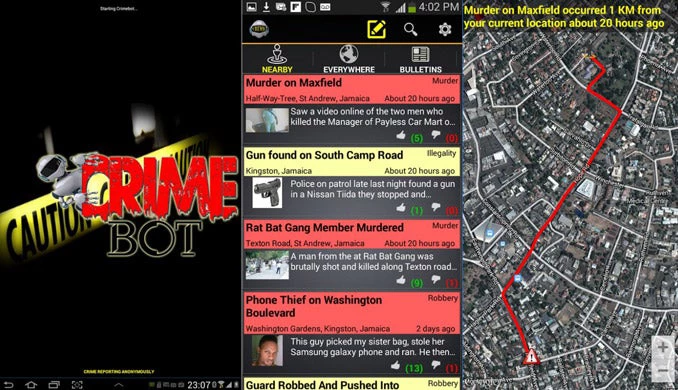
Using data to pinpoint high crime areas
CrimeBot (www.crimebot.net) fights crime by providing crime hotspot views and sending out alerts based on locations through mobile devices. By allowing citizens to submit information about suspicious activity in real-time, CrimeBot also serves as a tool to fight back against crime and criminals. As its base of users grow and information expands, CrimeBot can more accurately pinpoint areas of higher crime frequency for informed and improved public safety. Developed by a team in Jamaica, CrimeBot improves the "neighborhood watch" concept by applying mobile technology to information dissemination and real-time data collection. A Google Hangout discussion with CrimeBot team member Dave Oakley can be viewed through this link.
Data collection technology that helps reduce violence and crime
The CrimeBot team – Kashif Hewitt, Dave Oakley, Aldrean Smith, Garth Thompson – came together in the lead up to a Caribbean apps competition in Jamaica called Digital Jam 3, in which CrimeBot was awarded the top prize. Prior to entering the contest, the group researched the most pressing issues in the Caribbean and Jamaica, which turned out to be violence and crime.

The team decided to help Jamaicans fight and reduce crime by taking a deeper look at international statistics and conducting interviews with potential users of the app among friends and other contacts. In just 19 days of development, the team took CrimeBot from concept to working prototype.
The team discovered that 58% of crimes around the world go unreported. Interviews with potential users of the app revealed that many would-be tipsters feared for their safety, lacked confidence in local authorities, or preferred to take matters into their own hands. To counter some of these barriers, CrimeBot offers an anonymous way to report crime. While this doesn't directly solve crimes, CrimeBot provides law enforcement officials with better data, intelligence, and affords citizens and tourists greater protection through preventative measures.
Data processes and challenges
Currently, the "open" data that the CrimeBot app consumes is scraped from the web – specifically from the Jamaica Constabulary Force (police) site and media outlets like the Jamaica Observer, Gleaner, and Loop Jamaica.
The team is interested in negotiating a more real-time pull of information directly from the trusted sources above. Rather than sometimes waiting up to 3 days, a real-time exchange of data would allow CrimeBot to share notifications more quickly with its user base. Particularly when it comes to missing children, minimizing this delay is critical in improving the chances of a positive resolution. This way, data from government agencies do not just sit in a database but are more dynamically situated to be seen or acted on.
The process of using data that CrimeBot collects for relevant authorities could also be expedited. For now, user submitted crime reports go through a validation process and are held in CrimeBot's database; however, the team is interested in developing a process that allows these reports to be sent directly to Jamaica's Ministry of National Security through an Application Program Interface (API). CrimeBot's success will also rely on growing its base of users which further enhances the collection and usefulness of crime data. The team is exploring partnerships with relevant government agencies and security groups to these ends.
Results and next steps
In its first month, CrimeBot was downloaded over 500 times and boasts an impressive 66% retention rate. iOS and Blackberry applications are planned for further development. While continuing to work towards increasing adoption and use in Jamaica, the team seeks official backing from both the government and private sector entities. CrimeBot also hopes to unleash its application more broadly across the Caribbean and to other countries in South America and Asia. They are also exploring tailoring the product to other institutions with safety needs, like universities. The data that CrimeBot collects is freely available for government agencies and other civic-minded groups, but the team is also exploring ways to monetize access by other users.
More about CrimeBot
To learn more about CrimeBot, visit www.crimebot.net, download the mobile application (Google Play), reach out to them on Twitter @CrimeBot or email contact@crimebot.net .
Join us on Fridays, at 10:30 EST for Google Hangouts discussing specific uses of open data and the interesting people behind them. See what we've covered so far and have coming up next on our Open Data Use Hangouts Calendar.
World Bank Group Finances is the online access point for IBRD, IDA, and IFC open financial data. The website features datasets that cover loans, contracts, trust funds, investments, and financial statements. A related mobile app, which allows you to “talk” to us more easily about operational and financial data in nine languages, is available for download for Android and iOS smartphone and tablet users at the Google Store and the iTunes Store, respectively.
Follow us on Twitter to join and remain engaged in the conversation about the Bank’s open financial data.




Join the Conversation